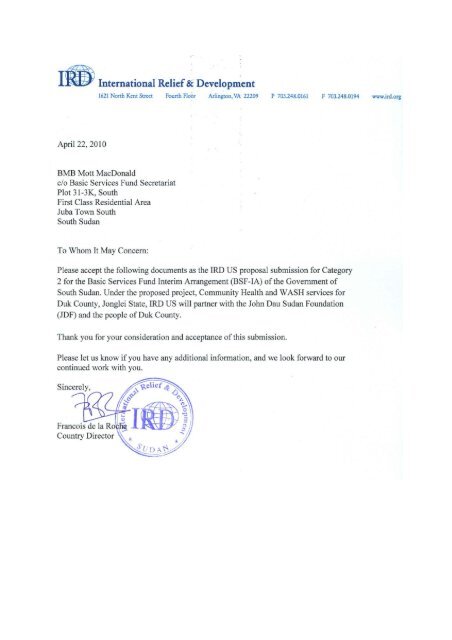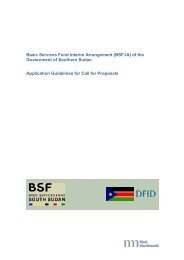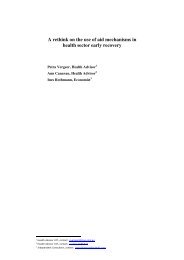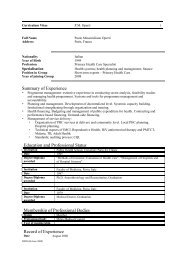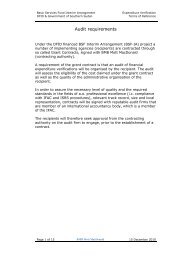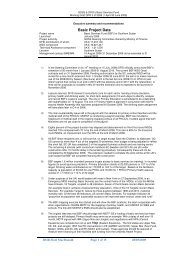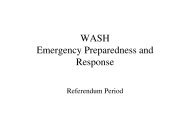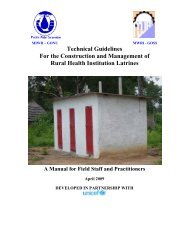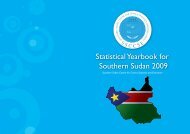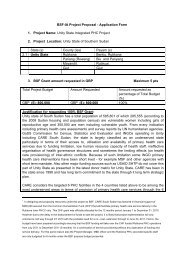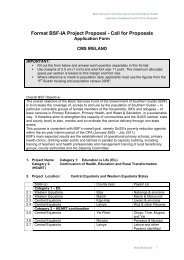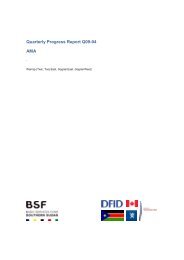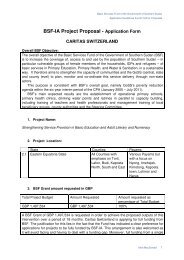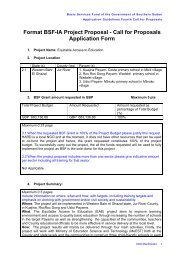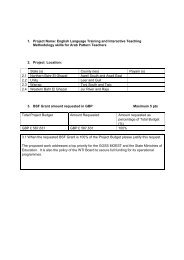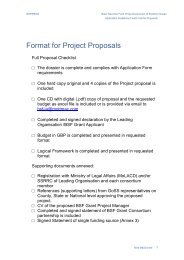IRD BSF-IA Proposal - Basic Services Fund SOUTH SUDAN
IRD BSF-IA Proposal - Basic Services Fund SOUTH SUDAN
IRD BSF-IA Proposal - Basic Services Fund SOUTH SUDAN
You also want an ePaper? Increase the reach of your titles
YUMPU automatically turns print PDFs into web optimized ePapers that Google loves.
Format <strong>BSF</strong>-<strong>IA</strong> Project <strong>Proposal</strong> - Call for <strong>Proposal</strong>s<br />
Application Form<br />
IMPORTANT:<br />
• Fill out the form below and answer each question separately in this format.<br />
• Use margins of 2.5 cm (1 inch) and arial font size 11 point. The maximum allocated<br />
space per section is based on this margin and font size.<br />
• Where reference is made to population data, applicants must use the figures from the<br />
“5 th Sudan housing and population census 2008”<br />
Overall <strong>BSF</strong> Objective:<br />
The overall objective of the <strong>Basic</strong> <strong>Services</strong> <strong>Fund</strong> of the Government of Southern Sudan (<strong>BSF</strong>)<br />
is to increase the coverage of, access to and use by the population of Southern Sudan – in<br />
particular vulnerable groups of female members of the households, IDPs and refugees – of<br />
basic services in Primary Education, Primary Health, and Water & Sanitation, in a sustainable<br />
way. It therefore aims to strengthen the capacity of communities and the GoSS (central, state<br />
and county level) to plan, monitor and co-ordinate this service delivery through non-state<br />
actors. This purpose is consistent with <strong>BSF</strong>’s overall goal, namely GoSS’s poverty reduction<br />
agenda within the six year interim period of the CPA (January 2005 – July 2011).<br />
<strong>BSF</strong>’s main expected results are the establishment of operational primary schools, primary<br />
health clinics, drinking water points and latrines in parallel to capacity building, including<br />
training of teachers and health professionals and management training of local beneficiary<br />
groups, county authorities and the Steering Committee.<br />
1. Project Name:<br />
Community Health and WASH services for Duk County, Jonglei State<br />
2. Project Location:<br />
State (s) County (ies) Payam (s)<br />
2.1 Jonglei Duk Mareng (County seat),<br />
Dongchak, Payuel,<br />
Panyang, Pagaak,<br />
Pagaleng, Ageer,<br />
Padiet<br />
3. <strong>BSF</strong> Grant amount requested in GBP Maximum 5 pts<br />
Total Project Budget Amount Requested Amount requested as<br />
percentage of Total Budget<br />
(%)<br />
GBP 1,469,982 GBP 1,469,982 100%<br />
3.1 When the requested <strong>BSF</strong> Grant is 100% of the Project Budget please justify this<br />
request.<br />
Project activities will be 100 percent funded by <strong>BSF</strong>. International Relief and Development,<br />
US has recently received funding from the U.S. Department of State’s Bureau of Population,<br />
Refugees and Migration (BPRM) to implement an agriculture project in Duk and Twic<br />
Counties. The duration of this project is from May 2010 to May 2011. Some of the BPRM<br />
project staff will be co-located at the current <strong>IRD</strong> accommodation/office in Duk Payuel and will<br />
International Relief and Development US <strong>Basic</strong> <strong>Services</strong> <strong>Fund</strong> and Mott MacDonald 1
share some office costs, thus reducing overhead costs to the <strong>BSF</strong> funded programming in<br />
Duk county. For more information, please see Annex 1 for the Budget.<br />
3.4 When the project proposal includes more than one sector please give indicative<br />
amount per sector including all training for that sector.<br />
Health: GBP 277,771 Training and Capacity Building Health: GBP 338,434<br />
Water/Sanitation: GBP 143,820 Training and Capacity Building Wat/San: GBP 53,635<br />
Maximum 0.25 page<br />
4. Project Summary:<br />
Maximum 0.5 pages.<br />
Include information on where, what and how, with targets, including training targets<br />
and emphasis on working with government and/or civil society and sustainability.<br />
The overall goal of the project is to improve the health status of residents of Duk County. <strong>IRD</strong><br />
believes it can best contribute to this goal by improving the availability of, access to, and<br />
quality of primary health care and water and sanitation services over an 18 month period. To<br />
achieve this, <strong>IRD</strong> and its partner the John Dau Foundation (JDF) will continue to work closely<br />
with the payam, county and state health and water representatives and local authorities<br />
building on lessons learned during the current <strong>BSF</strong>-funded project, Community Health and<br />
Education <strong>Services</strong> for Southern Sudan (CHESS). The team will bring the Duk Lost Boys’<br />
Clinic (DLBC) in Duk Payuel up to the <strong>Basic</strong> Emergency Obstetric and Neonatal Care<br />
Primary Health Care Center (BEmONCPHCC) level through rehabilitation, construction and<br />
equipment as outlined in the BPHS. As part of this, <strong>IRD</strong> will work with DLBC to improve the<br />
cold chain for vaccinations and outreach capabilities to improve vaccination and Vitamin A<br />
coverage to 40 percent. The project will equip three Primary Health Care Units (PHCU) in<br />
Mareng, Pakam and Pajut and construct one PHCU in Pagaak to meet the BPHS standard.<br />
36 people or 40 percent of county health workers (CHW) and Traditional Birth Attendants<br />
(TBA) will be trained and certified by the Ministry of Health (MoH) trainers. The team will work<br />
with the four Boma Health Committees (BHCs) formed under CHESS and train an additional<br />
13 BHCs linked to other county PHCUs. <strong>IRD</strong> will improve awareness of common health<br />
issues and increase demand for services through 16 health and hygiene campaigns (two per<br />
payam) while training 16 Alternative Education Systems (AES) instructors on health and<br />
hygiene issues. Throughout the project, <strong>IRD</strong> will strengthen the capacity of the County Health<br />
Department (CHD) and local authorities in health service delivery. The CHD take part in<br />
assessments, monitoring and planning for health service delivery; and linking the CHD to<br />
local authorities and communities through quarterly payam-based meetings. At the payam,<br />
county and state levels, <strong>IRD</strong> will improve associated water and sanitation services by working<br />
with 15 Village Water Committees (VWC) formed under CHESS and form an additional 15<br />
linked to the boreholes rehabilitated near PHCUs. The VWCs will each elect one person to be<br />
trained as a pump mechanic. In collaboration with the state level water authorities and parts<br />
distributors, the project will establish a supply chain and stock of spare parts.<br />
5. Project Objective:<br />
Maximum 0.25 pages.<br />
Objective must be Specific, Measurable, Attainable, Realistic and Time-bound (SMART)<br />
The objective of the project is to improve the availability of, access to, and quality of primary<br />
health care and associated water and sanitation services in Duk County during an 18- month<br />
period. Specifically, <strong>IRD</strong> will continue to develop relationships formed under CHESS at the<br />
state, county, and payam levels to improve primary health care service delivery and<br />
strengthen health personnel capacity, while improving infrastructure necessary for service<br />
provision and increasing community awareness on basic health issues. The project will<br />
support the CHD in carrying out its function in ensuring the above are carried out according to<br />
the BPHS. At the payam, county and state levels, the project will improve associated water<br />
and sanitation services through borehole rehabilitation and training of VWCs and pump<br />
mechanics with a focus on water quality and appropriate supervision.<br />
International Relief and Development US <strong>Basic</strong> <strong>Services</strong> <strong>Fund</strong> and Mott MacDonald 2
6. Justification: Maximum 40 pts<br />
Maximum 2 pages, Category 2:<br />
6.1 Relevance of the project to <strong>BSF</strong>’s overall objectives.<br />
<strong>IRD</strong> will support <strong>BSF</strong>’s objective through the improved coverage of, access to and use of<br />
basic primary health and associated water and sanitation services in Duk County, Jonglei<br />
State. This is an essential part of the county’s rebuilding of community and basic support<br />
services. The project will engage local authorities, and, through project design,<br />
implementation, monitoring and evaluation, build their capacity to deliver sustainable services.<br />
With a focus on sustainability, the project will continue to support the function of the county,<br />
CHD and communities in providing the continuation of basic services currently supported by<br />
<strong>BSF</strong> in Duk to the most vulnerable groups. The project will link these sectors and services<br />
through community and local authority involvement to improve overall health status.<br />
6.2 What GoSS sector priorities as described in the application guidelines will the<br />
project address?<br />
In designing the proposed project, <strong>IRD</strong> collaborated with representatives from the Duk County<br />
Commissioner’s Office, the CHD, Jonglei State MoH office in Bor, Ministry of Water<br />
Resources and Irrigation, and other local stakeholders. Project activities in health and water<br />
and sanitation were designed to meet both community and GoSS priorities, while building on<br />
lessons from implementation of the CHESS project. Of the targets identified as supported by<br />
the <strong>BSF</strong>-<strong>IA</strong> and GoSS in the health sector, this project will address the continued provision of<br />
the BPHS within Duk County, supported by <strong>BSF</strong> under CHESS, including support for inservice<br />
and formal trainings of health care workers, and support for the MoH in strengthening<br />
the CHD and community capacities to supervise and manage health services. The project will<br />
raise community awareness of basic health issues through hygiene campaigns and increase<br />
demand for health services, while strengthening the performance and involvement of BHCs,<br />
the CHD, and other traditional governance structures including chiefs and local leaders. As<br />
Jonglei state is one of the four states with a Lead Agent under the Umbrella Program for<br />
Health Systems Development (UPHSD), <strong>IRD</strong> will continue to support the provision of health<br />
services in Duk with UPHSD support and cooperation. All health related activities have been<br />
designed to cover 10 of the 13 MoH-identified high-level impact indicators. Planned health<br />
activities will align with the Health Policy for the Government of Southern Sudan 2006-2011<br />
and policy statements on community participation, primary healthcare and implementation of<br />
basic service package, facility infrastructure development, pharmaceuticals and medical<br />
supplies, institutional and human resource development, and coordination.<br />
The associated water and sanitation activities, while linked to health facility improvements,<br />
are also designed to meet priorities of the GoSS Infrastructure sector. <strong>IRD</strong>’s project will<br />
provide clean water to the PHCUs and surrounding communities through the rehabilitation of<br />
15 boreholes. <strong>IRD</strong>, in close coordination with the MWRI and the Jonglei State Directorate, will<br />
plan and report on water quality testing for these sites. <strong>IRD</strong> will provide training consistent<br />
with GoSS policy on rural hygiene and sanitation, and water management to 30 VWCs (15<br />
already organized under CHESS project). <strong>IRD</strong> will train 30 pump mechanics with a target of<br />
30 percent female. As Duk does not currently have a county water department, <strong>IRD</strong> will work<br />
closely with the local authorities to establish systems and procedures and create a supply of<br />
county spare parts. <strong>IRD</strong> will construct one PHCU (Pagaak) and one institutional latrine block.<br />
6.3 What underserved / priority counties as identified by GoSS and described in the<br />
application guidelines are targeted?<br />
<strong>IRD</strong> will continue to support health and water and sanitation services in underserved Duk<br />
County. The county continues to experience population growth from returning war-displaced<br />
populations and from neighboring counties. Due to the uncertainty surrounding the April<br />
elections, the movement of people, the reduction of services, and possibly <strong>IRD</strong>’s current <strong>BSF</strong>funded<br />
CHESS project, even more individuals have been accessing services in Duk,<br />
particularly at the DLBC whose monthly average consultations jumped from 1,210 in January<br />
to 2,457 in March 2010. <strong>IRD</strong> is one of the only INGOs operating in Duk County; while Catholic<br />
International Relief and Development US <strong>Basic</strong> <strong>Services</strong> <strong>Fund</strong> and Mott MacDonald 3
Relief <strong>Services</strong> has provided funds through local NGO Sudan Medical Care (SMC) to cover<br />
the salaries of health personnel, but is not providing direct support in Duk at present.<br />
6.4 The different target groups and beneficiaries of the project and the specific needs<br />
and constraints of these groups.<br />
Project activities will target all eight payams including Mareng, the Duk County headquarters.<br />
Direct beneficiaries of trainings and direct outreach services are estimated to be 7,500. Under<br />
the program approximately 10,000 children under 5 and 31,000 women of reproductive age<br />
will benefit directly from improved health care services. Additional targeted beneficiaries will<br />
include the elderly, returnees, IDPs, health care service providers, county health teams, local<br />
government authorities, and community workers. Through the project interventions all 65,588 1<br />
Duk County residents will benefit indirectly from improved services and health education and<br />
hygiene campaigns, as well as EPI interventions which will be conducted in all eight payams.<br />
According to the JDF, the MoH, and the County Commissioner, communicable diseases such<br />
as malaria, acute upper respiratory infections, acute watery diarrhea, anemia, malnutrition,<br />
measles and mumps, cases of guinea worm, and imported cases of Kala-zar (leshmaniasis)<br />
remain a threat to children and families. There are also many cases of pelvic inflammatory<br />
disease and urinary tract infections, indicating that sexually transmitted infections (STIs) are<br />
common. HIV/AIDS has made an appearance among returnees and outbreaks of cholera and<br />
polio were identified at the DLBC. Duk County has a high level of war-displaced returns, and<br />
is vulnerable due to its lack of health, water and sanitation services, and infrastructure. State<br />
and County government understand the needs, and are motivated to progress. The County<br />
Commissioner and State level MoH officials cite training for BHCs, EPI coverage, and<br />
rehabilitation of boreholes and trained mechanics as the most pressing needs in the county.<br />
Regular support of the PHCCs and PHCUs has been intermittent over the last several<br />
decades however some health care workers have continued on a voluntary basis. SMC<br />
supports 5 PHCUs and 1 PHCC through CRS support, however, this is primarily for salaries<br />
and we are not aware of any trainings taking place. SMC has begun rehabilitation of the nonfunctioning<br />
PHCC in Poktab in March of this year. In the county there is at present no<br />
functional PHCC as per BPSH standards, only the aforementioned non-functional PHCC in<br />
Poktab and the JDF DLBC that currently surpasses the BPSH criteria for a PHCU, but falls<br />
short of meeting the standards specified for PHCCs. ASCOM also runs a hospital in Padiet,<br />
which is the next level of referral for the DLBC. There are 15 PHCUs; and outside of the three<br />
constructed by <strong>IRD</strong> under CHESS, all facilities are little more than tukuls and face severe<br />
shortages of health supplies, and an unreliable supply chain of medicines with no cold chain.<br />
6.5 The extent to which women and girls are specifically targeted.<br />
<strong>IRD</strong> and JDF are committed to ensuring the inclusion of women and girls in all project<br />
activities. The project’s health component will address general health problems and include<br />
curative, preventive and promotional services which will target children under 5 and women of<br />
reproductive age. The project will specifically focus on child immunization, reproductive<br />
health, ANC, nutrition, and HIV/AIDS awareness and prevention. <strong>Services</strong> will be brought<br />
closer to women and children through the increased number of trained health providers,<br />
community health campaigns, vaccination, Vitamin A and de-worming campaigns, and<br />
provision of medicines and health supplies, as well as the construction of a PHCU. Also, JDF<br />
under CHESS, has begun a youth theatre group to raise HIV awareness and has trained 10<br />
girl participants who will continue activity under the proposed project. Further, <strong>IRD</strong> has trained<br />
16 AES teachers (2 female) who will provide health and hygiene education to adult students,<br />
whose enrolment rate is 62 percent female under CHESS. <strong>IRD</strong> will work to include women in<br />
the BHCs and VWCs and achieve a target of 30 percent female trained pump mechanics.<br />
This project will continue to include women and girls in community meetings with community<br />
member, local leaders, and paramount chiefs as it has under CHESS.<br />
1 The 5 th Sudan Housing and Population Census 2008<br />
International Relief and Development US <strong>Basic</strong> <strong>Services</strong> <strong>Fund</strong> and Mott MacDonald 4
7. Description of activities per result and sector: Maximum 5 pts<br />
Maximum 3 pages<br />
7.1 Include detailed description of each project output and the corresponding activities<br />
Under the proposed project <strong>IRD</strong> will focus on the health and water and sanitation sectors.<br />
Results in primary health care will include structural, equipment and material outputs. <strong>IRD</strong> will<br />
emphasize bringing health facilities up to the BPHS standard with close involvement of the<br />
CHD. <strong>IRD</strong> will work with JDF to bring the DLBC in Duk Payuel up to the BEmONCPHCC level<br />
through rehabilitation, construction, staffing and equipment needs. As the DLBC has<br />
undergone several improvements under CHESS, <strong>IRD</strong> will only need to provide an inpatient/observation<br />
area with 10 beds, separate maternity ward, minor surgical theatre area,<br />
climate controlled pharmacy area, improved 24 hr electrical supply and expanded staff<br />
housing. <strong>IRD</strong> will provide water harvesting and storage for the 3 PHCUs constructed under<br />
CHESS and construct one PHCU in Pagaak including an institutional latrine block.<br />
Equipment for the 4 PHCUs will be provided by the project and in collaboration with UNICEF.<br />
As part of this, <strong>IRD</strong> will work with JDF to expand and improve the cold chain to increase<br />
vaccination and Vitamin A coverage to 40 percent. The JDF has procured the necessary<br />
equipment including solar panels, medicine and lab test refrigeration equipment at the DLBC.<br />
The project will assist in maintaining the cold chain though training of staff and local<br />
authorities, while collaborating with UNICEF and GoSS for a sustained supply of medicines.<br />
The strengthened relationship between the local CHD, State and Juba level MoH, and<br />
UNICEF will work to avoid stock outages and generally increase the availability of MMR,<br />
BCG, DPT, Tetanus, OPV (polio) and other vaccines. To improve transportation, the project<br />
will also provide JDF with more cold boxes and motor bikes. Essential pharmaceuticals and<br />
IEC materials will be provided for the CHD, DLBC and 4 PHCUs. JDF will receive monthly<br />
funding to cover the cost of additional required pharmaceuticals not provided by the MoH.<br />
Results in primary health care training will include outputs involving the healthcare staff at the<br />
DLBC, CHWs, VCWs, AES instructors, the CHD and local authorities, as well as local<br />
communities. Training for health care service providers will include refresher/on-the-job<br />
training for the 9 staff at the DLBC covering topic areas for a BEmONCPHCC level facility.<br />
The project will support the DLBC with provision of salaries for all staff. As part of the EPI<br />
services mentioned above, <strong>IRD</strong> will support the DLBC in expanding the three person<br />
inoculators’ team and emphasize the use of child health cards. <strong>IRD</strong> will support the CHD in<br />
providing MoH CHW certification training for 40 percent (approx 27) of untrained CHWs and<br />
TBAs. The training will take place in Duk and participants will be provided with a stipend,<br />
living arrangements and food. Through an arrangement with the MoH in Bor instructors will be<br />
seconded for the 9-month training in Duk. The CHWs trained under the project will return to<br />
their PHCU post and receive top up of salary if not receiving this through the MoH. Selection<br />
criteria for training will be based on a community assessment, and take into account the<br />
amount of training to date, the recommendation of community members, and the motivation to<br />
work. <strong>IRD</strong> will also emphasize training of BHCs and continue to work with the four BHCs<br />
formed under CHESS in Payuel, Mareng, Pajut and Pakam. <strong>IRD</strong> will re-establish and train an<br />
additional 13 BHCs linked to other county PHCUs. Member selection will be conducted in<br />
coordination with the CHD, local authorities and community leaders and seek to be a<br />
representative of the community and maintain a gender balance. Initial trainings will focus on<br />
basic health topics (per MoH curriculum) and relationship to project and PHCU activities.<br />
Members will be motivated to have ownership and involvement in community health activities.<br />
Their key functions will include health promotion, community mobilization for health education<br />
campaign activities, and active case finding and referral, as well as morbidity and mortality<br />
surveillance.<br />
BHCs will also be closely linked to the health and education campaigns conducted in each<br />
payam. <strong>IRD</strong> and the CHD will work to improve awareness of common health issues and<br />
increase demand for services through 16 health and hygiene campaigns (2 per payam<br />
conducted) and the training of 16 Adult Education System (AES) instructors on health and<br />
International Relief and Development US <strong>Basic</strong> <strong>Services</strong> <strong>Fund</strong> and Mott MacDonald 5
hygiene issues for classroom discussion. AES instructors who were trained and currently<br />
working under CHESS will continue to receive stipends under the proposed project and<br />
receive trainings on health and hygiene similar to the training of the BHCs. AES instructors<br />
will be motivated to include these topics in classroom lessons and discussions. Throughout all<br />
of the above activities, <strong>IRD</strong> will strengthen capacity of the CHD and local authorities in health<br />
service delivery by involving personnel at every step. This will be accomplished by improving<br />
the capacity of the CHD through close supervision and training to assess, monitor and plan<br />
for health service delivery; and linking the CHD to local authorities and communities through<br />
quarterly and activity driven payam based meetings. <strong>IRD</strong> will more activiely involve the CHD<br />
in meetings with chiefs and community leaders as supported under CHESS, to ensure project<br />
ownership and sustainability. These meetings also serve as forums to discuss equitable<br />
distribution of basic services across the county particularly in the more marginalized<br />
communities.<br />
Results in drinking water and sanitation will include the outputs of borehole rehabilitation and<br />
water quality testing. Under the current CHESS project in Duk, <strong>IRD</strong> has worked closely with<br />
the local authorities to identify and prioritize boreholes which need general maintenance and<br />
rehabilitation. <strong>IRD</strong> has identified 15 additional boreholes which are linked to or adjacent to the<br />
11 PHCUs and the PHCC which have not been part of CHESS rehabilitation. <strong>IRD</strong> will work<br />
with a local contracting group to assess the required needs at each site and produce a report<br />
for the MWRI. Water quality testing will be performed at each site and findings will be shared<br />
with the MWRI at state and Juba levels.<br />
Similarly, results in training water point committees will coincide with the above outputs and<br />
include training of VWCs, pump mechanics and local authorities. <strong>IRD</strong> will continue to work<br />
with the 15 VWCs formed under CHESS and form and train an additional 15 which will be<br />
linked to the 15 boreholes rehabilitated near PHCUs and PHCCs. VCWs will be trained in<br />
rural hygiene and sanitation issues, water management and community participation and<br />
ownership concepts. VWCs will nominate one member to be trained in basic maintenance<br />
and handling of the boreholes, for a total of 30. These mechanics will work in tandem with<br />
<strong>IRD</strong> capacity building at the PHCUs/PHCCs and they are the custodians of spare parts and<br />
equipment for borehole maintenance. <strong>IRD</strong> has a container which held medical supplies and<br />
shoes which can now be handed over to the county and for use as a warehouse for spare<br />
parts for quick response on boreholes to reduce community migration to other villages and<br />
stress on singular boreholes that leads to failure. <strong>IRD</strong> will work with County, payam and the<br />
WPC to ensure that refresher training and M&E is carried out regularly. <strong>IRD</strong> will also work<br />
closely with the state level water authorities, parts distributors, and UNICEF to establish a<br />
supply chain and stock of spare parts.<br />
Further, results in training in sanitation and provision of institutional latrines will be <strong>IRD</strong><br />
outputs for the project. <strong>IRD</strong> will construct one institutional latrine in Pagaak when constructing<br />
the PHCU. The latrine block will have one male and one female latrine, one patient washing<br />
area and one staff latrine. <strong>IRD</strong> will provide training in rural health and hygiene to the VWS,<br />
VWCs, and AES instructors. The health and hygiene campaigns in each payam will also<br />
involve these groups in disseminating messages. For more information please see Annex 4<br />
for the Training Table.<br />
7.2 Specify the role of each partner per output, if applicable, and describe the added<br />
value of each member of the proposed consortium.<br />
<strong>IRD</strong>’s role is to lead and ensure the successful implementation of project activities. <strong>IRD</strong> will<br />
work closely with the CHD, local authorities and community groups to achieve all project<br />
outputs. <strong>IRD</strong> has been operating in Duk County since 2009 and in South Sudan since 2004.<br />
<strong>IRD</strong> has projects in Upper Nile, Warrap and states with funding from UNCHR, NDI, BPRM<br />
and SRF. <strong>IRD</strong> will provide a sub-grant to JDF to ensure continuation of health services at the<br />
DLBC and the improvement of EPI services as in January 2010, DLBC was designated as<br />
County focal point for EPI by the MoH. JDF is committed to supporting the DLBC until it can<br />
International Relief and Development US <strong>Basic</strong> <strong>Services</strong> <strong>Fund</strong> and Mott MacDonald 6
e 100 percent supported by the MoH. <strong>IRD</strong> is committed to working with the JDF to help the<br />
DLBC to become a fully functional BEmONPHCC. As it has been one of the only functioning<br />
health facilities in the area – even receiving hundreds of patients each month from<br />
neighboring counties – <strong>IRD</strong> believes it can help JDF to better support the DLBC in delivering<br />
its services at the full BPHS level, and strengthen its link to the MoH at the county and state<br />
levels. JDF has been operating in Duk since 2005 and continues to receive financial and<br />
technical assistance from a Syracuse, New York based Committee and Board of Directors<br />
consisting of US doctors. Also, they receive several visits a year from visiting international<br />
medical professionals and students, which enhances in-service training and best practices.<br />
8. Methodology: Maximum 35 pts<br />
Maximum 3 pages<br />
8.1 Method of implementation, reasons for proposed methodology and whether the<br />
project is building on previous interventions and lessons learned (<strong>BSF</strong> and other).<br />
<strong>IRD</strong> has been implementing CHESS under <strong>BSF</strong> funding since January 2009. <strong>IRD</strong> presents<br />
the proposed methodology through evaluation of lessons learned, collaborations with local<br />
government officials, meetings with other relevant stakeholders and Mott MacDonald<br />
Monitoring visits. <strong>IRD</strong> will focus primarily on the health sector and contribute to associated<br />
water and sanitation service needs. <strong>IRD</strong> believes that limiting its focus to these two sectors<br />
will strengthen its impact in the relatively short term of the <strong>BSF</strong>-<strong>IA</strong> timeline of 18 months.<br />
The team will work closely with the CHD and local authorities to provide continued support to<br />
the CHD. <strong>IRD</strong> constructed three PHCUs under CHESS which cannot be handed over to<br />
county MoH until the County is able to support them. The proposed project will continue to<br />
support the CHD in managing these PHCUs through close supervision, equipment provision<br />
and water storage areas. <strong>IRD</strong> will construct one PHCU under the proposed project in Pagaak.<br />
The Pagaak PHCU was deemed a priority location in March 2009 but due to insecurity in the<br />
area in the fall of 2009, the Commissioner, CHD and local authorities decided this could not<br />
be completed under the timeframe of CHESS. In meetings for project design for the <strong>BSF</strong>-<strong>IA</strong><br />
project, all stakeholders have once again made this PHCU a priority. Further, <strong>IRD</strong> will provide<br />
increased oversight while working with JDF to assist the DLBC to achieve the BEPHCC<br />
standard according to the BPHS guidelines. The DLBC is classified as a PHCC but has not<br />
quite reached the BPHS definition of a PHCC. Investment in the clinic is important to the<br />
health status of the entire county and accordingly, further investment in its staff and facility are<br />
key to improving the quality of care available in the county. JDF will continue to implement<br />
EPI activities and the project will work closely with them to increase their capacity in delivering<br />
this much-needed service for the entire county. <strong>IRD</strong> will continue to focus refresher trainings<br />
for DLBC staff and oversight on specific areas identified by a <strong>BSF</strong> health consultant including:<br />
out-patient and consultations related to the PHCC appropriate package of services; nutrition<br />
counseling; use of child health cards; in-patient observation areas and maternity rooms;<br />
proper medicines storage; EPI oversight and proper planning; referral strengthening; general<br />
hygiene of staff and facility; medical waste management; TB patient handling; and HIV/AIDS.<br />
The lack of training of basic health personnel continues to be an issue in Duk County. <strong>IRD</strong><br />
has determined that a solid investment in long-term training of individuals appointed as CHWs<br />
and community TBAs to become MoH certified CHWs will go a long way in providing quality<br />
and sustainable basic health service delivery in the county. <strong>IRD</strong> will also continue to work with<br />
BHCs started under CHESS, and re-establish and train an additional 13 groups so that every<br />
PHCU in the county has a linked, active and trained BHC. <strong>IRD</strong> has also decided to continue<br />
to provide stipends to CHESS trained AES instructors as they have become an important<br />
communication channel within their respective communities. <strong>IRD</strong> established 8 AES centers<br />
under CHESS, and believes that providing this relatively small stipend to the 16 instructors<br />
would allow them to continue classes, providing a cost effective way to reach the community<br />
with concentrated basic health and hygiene messages. The enrollment rate increased to an<br />
average of 70 percent at each center in the first quarter of 2010, and as a result, a total of 940<br />
International Relief and Development US <strong>Basic</strong> <strong>Services</strong> <strong>Fund</strong> and Mott MacDonald 7
(62 percent female) adults are attending class. Further, as <strong>IRD</strong> has established itself under<br />
CHESS as a partner for education activities in Duk, continuing with this activity will be<br />
important in preserving <strong>IRD</strong>’s reputation and trust with local authorities and the communities<br />
at large. By training these instructors, <strong>IRD</strong> can also ensure further dissemination of health and<br />
hygiene messages to adults and school activities, as well as raising awareness of important<br />
health issues and county health services available, thus allowing for further community<br />
participation in health activities, particularly in more rural areas.<br />
Through all health component activities, <strong>IRD</strong> will provide increased support to the CHD. <strong>IRD</strong><br />
believes that providing staff to work in close coordination with the current CHD representative,<br />
and currently the WHO representative, will help fill the gap in regular CHD presence in the<br />
county. An emphasis will be placed on drug management and links to Bor. <strong>IRD</strong> will also<br />
provide office materials to ensure administrative functioning of the office. The <strong>IRD</strong> project staff<br />
will assist that CHD representative in better assessing current health facility and staffing<br />
situation needs and provide improved planning to meet these needs. The project will ensure<br />
the CHD has proper human resources, equipment, etc., required to run the CHD properly.<br />
<strong>IRD</strong> has been an active water and sanitation partner in Duk since January 2009. Under<br />
CHESS, <strong>IRD</strong> has worked closely with the local authorities to identify and prioritize boreholes<br />
which need general maintenance and rehabilitation. <strong>IRD</strong> has identified 15 boreholes which<br />
are linked to the PHCUs which have not been part of CHESS rehabilitation. Through VWC<br />
training, <strong>IRD</strong> noticed communities are motivated to be a part of water activities. Similarly, <strong>IRD</strong><br />
will continue to work with the 15 VWCs formed under CHESS and form and train an additional<br />
15 which will be linked to the 15 boreholes rehabilitated near PHCUs and PHCCs. VCWs will<br />
be trained in rural hygiene and sanitation issues, water management and community<br />
participation and ownership concepts. These VWCs are an important step in ensuring<br />
sustainability of water provision and community ownership, and this is strengthened with the<br />
added activities of training pump mechanics and providing a county spare parts warehouse.<br />
8.2 How will the proposed consortium function as a cohesive unit; describe lines of<br />
responsibility, supervision and management.<br />
<strong>IRD</strong> will be responsible for overall project management. The <strong>IRD</strong> project manager will be<br />
responsible for monitoring all project activities, while ensuring adherence to the work plan,<br />
timeline and budget. The <strong>IRD</strong> team in Duk will be supported by <strong>IRD</strong> staff in Juba and Health<br />
Technical staff at <strong>IRD</strong> headquarters. The project will provide a subgrant to JDF for the<br />
operation of the DLBC and EPI activities. JDF is committed to supporting the DLBC until it<br />
can be 100 percent supported by the MoH. JDF will employ a project manager to serve as<br />
coordinator for DLBC activities. The JDF PM will be responsible for report writing and financial<br />
management of <strong>BSF</strong> funds received to support the DLBC. JDF will employ the full staff for a<br />
BEmONCPHCC standard in close coordination with <strong>IRD</strong> and the CHD. <strong>IRD</strong> will report to and<br />
work closely with the CHD to build their capacity to deliver services as defined by the BPHS.<br />
8.3 Team proposed for implementation. Present the full team and describe who will<br />
fulfill which position, where appropriate per project location. For each team<br />
member specify his/her responsibilities in this project and duration of input. Also<br />
specify whether the position will be filled by a national or international expert.<br />
(Attach the CV of the proposed <strong>BSF</strong> Grant Project Manager to this application).<br />
In Duk County <strong>IRD</strong> will have a solid team over the 18 months of the project. <strong>IRD</strong> will provide a<br />
dedicated Project manager (PM) to oversee all financial and technical elements of the project.<br />
The proposed PM (please see attached CV in Annex 3), an international expert, has over 10<br />
years of health project coordination and management experience. The PM will manage<br />
project staff, follow work plans and direct technical aspects of the project and report to the<br />
Country Director. The PM will oversee the work of the Sudanese Admin/Finance Officer<br />
(AFO) who is responsible for day to day accounting, collection of receipts and documentation,<br />
and financial reporting. The AFO will also report to the Finance Manager in Juba. The PM will<br />
also work closely with the PHC Supervisor (international) who will coordinate activities of<br />
health workers, such as the CHWs at the PHCUs and clinical officers at PHCCs, and works<br />
International Relief and Development US <strong>Basic</strong> <strong>Services</strong> <strong>Fund</strong> and Mott MacDonald 8
with the CHD staff to improve Disease Surveillance, M&E, County Nursing, and Pharmacy<br />
Technician functions. The MCH Supervisor combines responsibilities of Maternal Health<br />
Coordinator of payam level and Nutrition Officer of the CHD, and does the same as PHC<br />
Supervisor, but specific towards TBAs and midwives. The MCH Superviser (Internationa) will<br />
work closely with JDF staff on nutrition project, ANC and Maternity Ward. The PM will also<br />
oversee the international Construction Manager/Water Sanitation Manager (CM/WSM) who<br />
will lead construction and rehabilitation activities, coordinate labor for activities, and be<br />
responsible for overall design per MoH guidelines. The CM/WSM will also work closely with<br />
the MWRI and local authorities to direct trainings for VWCs and pump mechanics and handle<br />
the water quality testing. The GoSS and Community Training Liaison (Sudanese) is<br />
responsible for community and local GoSS communication and mobilization in Duk County,<br />
and MoH and MWRI Directorate in Bor, and plans and coordinates meetings. A Sudanese<br />
Logistics Officer will work with the PM and CM/WSM for delivery of supplies and materials for<br />
distribution. The international JDF Project Manager (15 months) will also report to the PM and<br />
work closely with the PHC and MCH Supervisors and is responsible for coordination of project<br />
activities with the DLBC. All staff in Duk will report to and be supported by the team in Juba:<br />
the <strong>IRD</strong> Country Director, Finance Manager, Logistics Officer and Security Officer. The<br />
project will also receive technical assistance from an HQ based Technical Officer and an<br />
international Technical Consultant, to lead the assessments and base and end line surveys.<br />
8.4 Describe the partnership arrangements with government and other possible<br />
implementation partners (e.g. civil society) for effective project implementation.<br />
Since January 2009, <strong>IRD</strong> has worked closely with local government and traditional leaders<br />
throughout Duk’s eight payams. <strong>IRD</strong> has nurtured a strong relationship with the County<br />
Commissioner’s Office, the CHD and local authorities. These local stakeholders trust and<br />
recognize the results achieved under CHESS, while understanding that further <strong>BSF</strong> funding is<br />
an interdependent means for improved and sustainable service delivery. In planning for this<br />
project and future sustainability, project activities have been designed and prioritized in close<br />
coordination with the County Commissioner, local authorities, and state level MoH and MWRI<br />
representatives for Jonglei, and <strong>IRD</strong> has their commitment to support and maintain project<br />
investments. Under the proposed project, these established relationships will be enhanced<br />
through an increased mentoring approach in which <strong>IRD</strong> staff will provide close guidance for<br />
sector planning, implementation and monitoring. Project staff will be dedicated to providing<br />
service delivery actors with training and support to achieve even more tangible results, thus<br />
building community and local leader trust in service delivery maintenance and ownership.<br />
8.5 Describe the NGOs exit strategy (and therefore a government/civil society entrystrategy):<br />
Specify a training and capacity building plan to ensure that project<br />
activities be continued by government or civil society partners in a sustainable<br />
manner after project closure?<br />
<strong>IRD</strong> has attempted to realistically assess the complexity of the current situation of the health<br />
and water and sanitation systems of South Sudan, and particularly in Duk County, and<br />
understands that full sustainability can not be achieved within the life span of this project.<br />
Therefore, <strong>IRD</strong> will adhere to a strategy of step-by-step transition from fully dependant to a<br />
sustainable and functioning basic service delivery system from a long-term perspective. This<br />
project is still primarily focused on initial steps of the rebuilding of the health and water and<br />
sanitation system. <strong>IRD</strong> will invest in quality healthcare infrastructure, professional capacity of<br />
health and water and sanitation personnel, and introduction of managerial tools and systems.<br />
At the same time, local government, civil society and communities will gradually become more<br />
involved in management of these systems and accept more ownership. The next stage of the<br />
exit strategy in the long-term will be to hand over all managerial responsibilities to the CHD<br />
and persons in charge of health facilities, but with strong coordination, supervision and advice<br />
from <strong>IRD</strong>. However, the full exit cannot be possible until the government is able to finance the<br />
health system in full. Thus, <strong>IRD</strong> will use a mixed approach in its exit strategy based on<br />
gradual transition from a humanitarian aid project to one more focused on the provision of<br />
technical assistance. To ensure that the proposed initial stage of this exit strategy is<br />
International Relief and Development US <strong>Basic</strong> <strong>Services</strong> <strong>Fund</strong> and Mott MacDonald 9
successful, <strong>IRD</strong> has developed a plan for capacity building of health workers and health<br />
administration of the county, which includes: 1) the development and introduction of job<br />
descriptions and standard operating procedures; 2) the introduction of treatment protocols<br />
through formal and in-service trainings; 3) the introduction of managerial tools, such as a drug<br />
management system; 4) training on the MoH health information system; and 5) trainings in<br />
basic logistic and financial accounting for the CHD team. Also key is the introduction of a<br />
strong monitoring system on overall activities and <strong>IRD</strong> will work closely with the CHD team<br />
and health care personnel to develop this system. <strong>IRD</strong> believes by the end of the project the<br />
basis for a comprehensive, properly functioning health system for the county will be formed.<br />
9. Logical Framework: Maximum 5 pts<br />
9.1 Complete the logical framework for the proposed project. Use the format attached<br />
to this document in annex 2 to this application form<br />
Please see the logical framework in Annex 2.<br />
9.2 Related to this logical framework; describe how the indicators will be measured to<br />
monitor project success. (Maximum 0.5 page)<br />
Achievement of project results will be measured through a number of data collection methods<br />
from several data sources. <strong>IRD</strong> plans to monitor the project through a combination of output<br />
and outcome indicators using routine monitoring, site visit, health facility assessments and<br />
KAP surveys. Project field staff will routinely collect monitoring data and conduct sites visits of<br />
activity and beneficiaries (ie. health facilities, CHWs, TBAs, AES instructors, BHCs, and<br />
VWCs), which serves as the basis of all reporting needs. Indicators related to WASH activities<br />
will also be measured through routine monitoring and site visits. Project manager will process<br />
the data and track project progress against the logframe targets on an indicator tracking table<br />
to be developed after the award. To assess the health facility, <strong>IRD</strong> will conduct a health facility<br />
assessment at the start and end of the project to measure indicators related to primary health<br />
care. The assessment instrument will include BPHS standards for BEmONCPHCC and<br />
PHCUs. These assessments will be conducted by <strong>IRD</strong> staff at the 5 facilities<br />
constructed/rehabilitated by <strong>IRD</strong> (4 PHCUs and 1 PHCC). For outcome indicators, <strong>IRD</strong> plans<br />
to conduct a baseline and final survey of knowledge, attitudes and practices (KAP) related to<br />
primary health care in the communities surrounding the <strong>IRD</strong>-supported facilities. These<br />
surveys will provide insight on the use of facilities, results of the awareness raising activities in<br />
the community and results of community training activities. <strong>IRD</strong> will also verify project data<br />
against the South Sudan Second Household Health Survey planned for completion in 2010<br />
and the HMIS. In addition the project will support some of the Ministry of Health priority<br />
indicators by including them in the project logframe.<br />
10. Efficiency: Maximum 5 pts<br />
Maximum 0.5 page.<br />
Efficiency in this context is a measure of how economically resources and inputs,<br />
funds, expertise, and time etc. are converted into results or deliverables.<br />
10.1 Relationship between direct and indirect costs<br />
<strong>IRD</strong> has charged 7 percent administrative costs on direct project costs. The program and<br />
administrative costs are 60 percent and 40 percent, respectively, of the total program budget.<br />
10.2 Include unit costs of main deliverables – e.g. per classroom, borehole, PHCU,<br />
latrine, teacher trained, village health committee member trained, etc.<br />
<strong>IRD</strong> calculates the following unit costs of the main deliverables:<br />
Per Village Water Committee Member trained: GBP 81.36<br />
Per VWC member receiving refresher training: GBP 61<br />
International Relief and Development US <strong>Basic</strong> <strong>Services</strong> <strong>Fund</strong> and Mott MacDonald 10
Per Boma Health Committee Member trained: GBP 146.50<br />
Per CHW Trained: GBP 1,674 (includes 9 month room and board)<br />
Per Pump Mechanic Trained: GBP 173<br />
Per PHCU constructed: GBP 48,818<br />
Per Institutional Latrine Constructed: 4,882<br />
Per Borehole Rehabilitated: GBP 4,882<br />
All project costs are in line with the current CHESS Program funding and with averages<br />
observed elsewhere in Southern Sudan.<br />
11. Potential Impact: Maximum 5 pts<br />
Maximum 0.5 page.<br />
Describe short-term and long-term effects of the <strong>BSF</strong> intervention. Define both positive<br />
and negative, both direct and indirect, and both intended and unintended effects.<br />
Include environmental, gender and conflict prevention aspects.<br />
In the short-term, the proposed project will increase the number of fully functioning PHCUs<br />
and PHCCs and the number of trained health personnel, and thereby increase availability of<br />
PHC services in the county. Cold chain infrastructure and equipment will be improved, and<br />
will allow for greater vaccination and vitamin A coverage for children. Essential medicines will<br />
also be made available through inputs and drug management strengthening. Through the<br />
proposed health and hygiene awareness activities, residents of Duk county will be better<br />
informed about general health issues and the health services available to them. In addition,<br />
the project will increase the number of operational boreholes and thereby increase availability<br />
of water for the health services and the communities they serve. The project will also train<br />
VWCs and pump mechanics and provide a spare parts supply to work towards sustainable<br />
and long lasting water supply. Through all training activities with CHWs, BHCs, VWCs and<br />
pump mechanics, <strong>IRD</strong> will work to include women.<br />
The proposed project includes activities that will produce long-term results beyond its<br />
duration. <strong>IRD</strong> will work to develop capacity at the county level to manage, monitor and<br />
evaluate health services, leaving tools and systems in place that can be used by future<br />
generations of county health personnel. These systems and tools will contribute to ensure<br />
transparency, accountability, rationality and cost-effectiveness in the management of financial<br />
resources; establish a routine monitoring and evaluation system and guide the development<br />
of short and medium term plans which will contribute to a long term strategy. Ultimately, these<br />
tools and systems will ensure that the short-term effects of the project are sustained.<br />
12. The Lead Agent or <strong>BSF</strong> Grant Applicant:<br />
12.1 Identity<br />
Legal or business name International Relief and Development US<br />
Acronym<br />
<strong>IRD</strong><br />
Legal status<br />
Registered with Ministry of Legal Affairs of South Sudan<br />
Official address HQ: 1621 North Kent Street, Arlington, VA 22209<br />
Juba: Kololo Rd, 1km north of US Consulate, Tongping, Juba,<br />
Sudan<br />
Postal address HQ: 1621 North Kent Street, Arlington, VA 22209<br />
Juba: Kololo Rd, 1km north of US Consulate, Tongping, Juba,<br />
Sudan<br />
Chairman of the Board<br />
(if applicable)<br />
Name: Dan Florea<br />
Email: board@ird-dc.org<br />
International Relief and Development US <strong>Basic</strong> <strong>Services</strong> <strong>Fund</strong> and Mott MacDonald 11
Chief Executive Officer<br />
(if applicable)<br />
Contact person for the <strong>BSF</strong><br />
grant<br />
Name: Dr. Arthur Keys<br />
Name: Francois de la Roche<br />
(<strong>IRD</strong> South Sudan); Maria<br />
Miralles (<strong>IRD</strong> HQ)<br />
Email: akeys@ird-dc.org<br />
Email: fdelaroche@ird-dc.org;<br />
mmiralles@ird-dc.org<br />
Telephone numbers 703-248-0161<br />
Fax numbers<br />
Website address<br />
www.ird-dc.org<br />
MoLACD and/or SSRRC (Please see copy of the registration in Annex 5)<br />
registration<br />
12.2 Bank Details<br />
Account name<br />
International Relief and Development US<br />
Account number 5303551021<br />
SWIFT<br />
PNCCUS33<br />
Bank name<br />
PNC Bank<br />
Bank address 800 Connecticut Ave. NW, Washington, DC 20006<br />
Name and position of Dr. Arthur B. Keys, CEO and President<br />
signatory (ies)<br />
Beverly Armstrong, Chief Financial Officer<br />
Elsie Tama, Director of Program Resources<br />
Ingrid Fitzgerald, Chief Administrative Officer<br />
13. Members of the Consortium (other than the Lead Agency):<br />
This section must be completed by each member of the Consortium.<br />
Fill in one table per consortium member – make as many copies of this table as needed.<br />
Legal or business name<br />
The John Dau Foundation<br />
Acronym<br />
JDF<br />
Legal status<br />
501(c)3 non-profit, OFAC licensed<br />
Nationality<br />
Sudan based with US support from Board of Directors<br />
Official address 97 East Genesee St/Skaneateles, NY 13152<br />
Contact person Name: Tom Dannan Email:<br />
tdannan@johndaufoundation.org<br />
Chief Executive Officer or<br />
Director and duty station<br />
Name: John Dau, CEO<br />
and President<br />
Email:<br />
dengakol@johndaufoundation.org<br />
Chairman of the Board of<br />
Trustees/Governors<br />
Name: Jack Howard<br />
Email: rljwh@aol.com<br />
Telephone numbers (315) 685 – 5048, 1-800-759-4443<br />
Fax numbers (315) 685-3848<br />
Website address<br />
www.johndaufoundation.org<br />
International Relief and Development US <strong>Basic</strong> <strong>Services</strong> <strong>Fund</strong> and Mott MacDonald 12
1 Project Budget<br />
International Relief and Development US <strong>Basic</strong> <strong>Services</strong> <strong>Fund</strong> and Mott MacDonald 13
International Relief and Development US <strong>Basic</strong> <strong>Services</strong> <strong>Fund</strong> and Mott MacDonald 14
International Relief and Development US <strong>Basic</strong> <strong>Services</strong> <strong>Fund</strong> and Mott MacDonald 15
International Relief and Development US <strong>Basic</strong> <strong>Services</strong> <strong>Fund</strong> and Mott MacDonald 16
International Relief and Development US <strong>Basic</strong> <strong>Services</strong> <strong>Fund</strong> and Mott MacDonald 17
2 Logical Framework<br />
International Relief and Development US <strong>Basic</strong> <strong>Services</strong> <strong>Fund</strong> and Mott MacDonald 18
International Relief and Development US <strong>Basic</strong> <strong>Services</strong> <strong>Fund</strong> and Mott MacDonald 19
3 <strong>BSF</strong> Grant Project Manager CV<br />
JUDITH BAMUTURAKI<br />
Permanent Address: P. O. Box 338 Fort Portal, UGANDA<br />
Email: jumfotl@yahoo.co.uk Tel: +256 772 493 465<br />
EDUCATIONAL BACKGROUND/TRAINING<br />
2008- London School of Hygiene & Tropical Medicine. Masters in Public Health (continuing)<br />
2007 Swiss Tropical Institute, Certificate: Health District Management<br />
(I) Programme Design and Planning<br />
(II) Priority setting and Resource Allocation at District Level<br />
2007 Swiss Tropical Institute, Post Graduate Diploma (Core course for Masters in<br />
International Health)<br />
Health Care and Management in Tropical Countries (HCMTC)<br />
2006 Training in Guidelines for HIV/AIDS interventions in emergency settings<br />
2005 USAID/Monitoring & Evaluation Management <strong>Services</strong> (MEMS)<br />
Certificate: Programme Performance Monitoring<br />
2005 Population <strong>Services</strong> International, Certificate: HIV <strong>Basic</strong> Care Package Trainer<br />
2005 AIDS Information Centre Certificate: HIV/AIDS Counselor<br />
2004 Uganda Management Institute Certificate: Training of Trainers<br />
2004-2005 Uganda Management Institute Post Graduate Diploma: Management Studies<br />
2003 PSI Washington Certificate: Building Capacity in Social Marketing<br />
1999 Makerere University, Kampala Certificate: Introduction to Gender & Development<br />
1996 College of Professional Management Diploma: Personnel Management & Industrial Relations<br />
1993-1996 Makerere University, Kampala Degree: BA Honors. in Social Sciences<br />
PROFESSIONAL EXPERIENCE<br />
12/08 – to 11/09 mothers2mothers (m2m), Cape Town, South Africa<br />
Programme Development Manager for Malawi<br />
Provided oversight for management, operations and further expansion of<br />
mothers2mothers’ branch organization in Malawi,<br />
Engaged in dialogue with Ministry of Health and partners to ensure transition and<br />
national integration of the program into Malawi’s health system<br />
Built capacity of the in-country management team to manage all aspects of the<br />
programme including human resources, training, monitoring and evaluation and<br />
Finance<br />
Acted as key liaison between country office and headquarters, including facilitating<br />
interactions with supporting services e.g. Human Resource, Finance, M & E, IT and<br />
Program.<br />
Supervised the in-country Manager<br />
Ensured prudent use of program funds and management of key donor requirements<br />
and relationships<br />
03/08 – 11/08 William J. Clinton Foundation HIV and AIDS Initiative, Liberia, West Africa<br />
Yale University-Clinton Foundation Fellow in International Health Management:<br />
International Relief and Development US <strong>Basic</strong> <strong>Services</strong> <strong>Fund</strong> and Mott MacDonald 20
Strengthened health systems at local level in support of the government of Liberia’s decentralization policy<br />
Supported implementation of the National and County annual Health Plans and <strong>Basic</strong> Package of Health<br />
<strong>Services</strong><br />
Built management capacity within the health services department at County level<br />
Provided administrative and planning assistance to the County Health Team (CHT)<br />
Improved coordination between central Ministry of Health and County leadership<br />
Promoted coordination structures at County level between the CHT and other health partners<br />
Provided support in HIV program implementation as required by the CHT<br />
02/08 -03/08 United High Commissioner for Refugees Representation in Uganda (UNHCR), East Africa<br />
HIV Technical Consultant<br />
Worked as HIV Technical Consultant for an HIV risk and vulnerability among internally displaced persons<br />
in Northern Uganda.<br />
August 2007<br />
Consultant<br />
Prepared a background note on socio-economic and demographic issues, challenges and programs related<br />
to HIV/AIDS among IDPs in Northern Uganda<br />
10/05 – 03/07 United High Commissioner for Refugees Representation in Uganda (UNHCR)<br />
National UNV HIV/AIDS Officer:<br />
Conducted programme planning, implementation, monitoring and co-ordinating HIV/AIDS objectives and<br />
activities for diverse refugee populations, internally displaced persons and other persons of concern to<br />
UNHCR<br />
Analysis and commentary on reports presented by UNHCR partners and finalization of all HIV/AIDS<br />
related implementation instruments<br />
Regularly updated the office on HIV/AIDS and reproductive health related policies, standards and practices<br />
Supporting local HIV/AIDS activities in order to appropriately compensate for the added burden of<br />
services for refugees<br />
Organizing the collection, analysis and distribution of study findings and possible epidemiological<br />
information on HIV/AIDS related reproductive health aspects among refugees<br />
Served as focal point with regards to collaboration with Ministry of Health and Uganda AIDS Commission<br />
Provided guidance, supervision and co-ordination of activities of UNHCR partners in HIV/AIDS<br />
programming<br />
Represented UNHCR in the UNAIDS Theme Group and technical committee meetings as required<br />
Advised UNHCR and implemented an active AIDS in the Workplace policy for staff<br />
Drafted proposals for funding as required.<br />
10/04 – 09/05 Population <strong>Services</strong> International (PSI) Uganda<br />
National Co-ordinator, HIV <strong>Services</strong> Program:<br />
Developed and co-ordinated a national HIV <strong>Services</strong> (VCT, PMTCT) communication program aimed at<br />
increasing awareness and use of HIV services in IDP camps and among the general population<br />
Prepared annual communication strategy, work plans and budgets and monitored adherence in designated<br />
sites<br />
Designed and developed communication tools for the campaign<br />
Identified and implemented BCC interventions required to achieve project objectives;<br />
Coordinated HIV counseling and testing (HCT) and information services in IDP camps<br />
Maintained information on all attributes and served as the technical expert on all aspects the services<br />
Worked with stakeholders at district and NGO level to maximize collaboration<br />
Generated quarterly national HIV <strong>Services</strong> progress reports to Senior Management<br />
International Relief and Development US <strong>Basic</strong> <strong>Services</strong> <strong>Fund</strong> and Mott MacDonald 21
Supervised procurement and co-ordination of logistics for the program<br />
Conducted budget monitoring and expenditure control and accountability for the program<br />
09/03 – 09/04 Population <strong>Services</strong> International (PSI) Uganda<br />
HIV <strong>Services</strong> Manager<br />
Developed, implemented and managed a regional HIV <strong>Services</strong> Program in Central and Western Uganda<br />
Developed a real-life testimonial campaign through mass media and Interpersonal communication<br />
Launched a promotional campaign in national sites to increase awareness and create demand for HIV testing<br />
and PMTCT<br />
Liaised with external partners in development and implementation of the program to maximize collaboration<br />
Promoted a support system for the services through local influencers<br />
Formalized referral network with existing partners to popularize care and support links<br />
Served as technical expert on all aspect of VCT and PMTCT<br />
Participated in development and of an impact evaluation and best practices studies<br />
Prepared annual budgets and conduct budget monitoring and expenditure control and accountability for the<br />
program<br />
2001 – 2003 Commercial Market Strategies (CMS) Project/PSI, Kampala, Uganda<br />
Product Co-ordinator; Voluntary Counseling & Testing (VCT) for HIV/AIDS:<br />
Developed and implemented a pilot communications campaign in partnership with AIDS Information Centre<br />
(AIC) to encourage increased use of VCT services in Mbarara and Kasese districts<br />
Popularized HIV testing as a positive and normal thing to do at important life stages of one’s life<br />
Developed communication campaign to promote VCT among couples<br />
Conducted budget monitoring and expenditure control and accountability for the program<br />
2000 – 2002 Product Co-ordinator; New Mama Kit (NMK):<br />
Developed and distributed a Clean Delivery Kit with basic items required for clean and safe delivery of<br />
babies in partnership with CARE International’s Community Reproductive Health Project (CREHP) in<br />
South-Western Uganda.<br />
Developed concept of pre-packed items for clean delivery<br />
Launched and popularized a NMK brand awareness campaign<br />
Developed a distribution strategy through rural and urban infrastructure<br />
Promoted a behavior change communication strategy<br />
Participated in development of an impact evaluation study<br />
Prepared and monitored annual budgets, expenditure and accountability for programme activities.<br />
09/99- 06/00 Kabarole Research Centre (KRC) Fort-Portal, Uganda<br />
Project Co-ordinator; Gender & Human Rights Abuse Program<br />
Awareness creation, lobbying and advocacy for rights of women and children<br />
Trained local/community leaders on women and children’s rights<br />
Promoted a support system between victims of abuse and legal entities<br />
Created Information Education and Communication (IEC) interventions through puppet theatre<br />
3.1.1<br />
3.1.2 TRAINING EXPERIENCE<br />
07 – 09/1999 Facilitated Gender & Women in Development training workshops for Community-based Organizations<br />
(CBOs) and local leaders in rural and urban communities<br />
• Empowered women with business skills to promote economic independence<br />
• Build capacity of leaders to include gender into mainstream activities<br />
International Relief and Development US <strong>Basic</strong> <strong>Services</strong> <strong>Fund</strong> and Mott MacDonald 22
RESEARCH EXPERIENCE<br />
2006 Participated in tool design, training and data collection for Great Lakes Initiative against AIDS (GL<strong>IA</strong>)<br />
program in Refugee Settlements hosting Rwandan and Congolese Refugees<br />
2000 –2005 Developed research materials with PSI research department<br />
1998 – 1999 Carried out Public Awareness Survey for MTN-Uganda<br />
Carried out Radio Listener-ship Survey for MTN-Uganda<br />
Carried out Customer Satisfaction Survey for Shell Uganda LTD shops<br />
Carried out market research for Shell Uganda LTD shops<br />
1998 –2000 Monitoring and Appraisal of HIVOS funded projects in Kabarole and Kasese Districts<br />
1997 Carried out research on School Dropouts in Uganda using Kabarole District as a case study<br />
ACCOMPLISHMENTS<br />
• Initiated PSI HIV in the Workplace Policy<br />
• Initiated a Corporate Social Responsibility project at PSI<br />
• Socially marketed a VCT pilot project in 2003 and increased uptake by 25% in Western Uganda<br />
• Successfully piloted Clean Delivery Kits in Southwestern Uganda resulting in extension of the project<br />
on a national level<br />
• Initiated leaders’ advocacy meetings in community outreach to promote social support for HIV testing<br />
• Streamlined procedures for community HIV <strong>Services</strong> events thus improving reporting and<br />
accountability systems and performance tracking<br />
• Product Co-ordinator of the Year 2001, CMS Project.<br />
Language Proficiency:<br />
Computer Literacy:<br />
English (excellent), French (Learning)<br />
Ms Office<br />
Referees:<br />
1. Ntuthu Sonjica<br />
Technical Advisor SA<br />
mothers2mothers<br />
78 Darling Street<br />
Cape Town, 8001, South Africa<br />
Work: +27 (0)21 466 9160<br />
Fax: +27 (0)21 466 9162<br />
Cell: +27 (0)82 499 7774<br />
ntuthu@m2m.org<br />
2. Dr. Dorothy E. Onyango | Health Coordinator<br />
International Rescue Committee - Liberia<br />
Mobile: +231 77 893568 | +231 6 620940 | skype: nyauholo<br />
Dorothy.Onyango@theIRC.org<br />
3. Tina Ghelli<br />
Snr. Regional External Relations Officer<br />
UNHCR Representation for Southern Africa<br />
Office phone +27(0) 12 354 8360<br />
Cell phone +27 (0)82 770 4189<br />
ghelli@unhcr.org<br />
International Relief and Development US <strong>Basic</strong> <strong>Services</strong> <strong>Fund</strong> and Mott MacDonald 23
4 Project Training Table<br />
International Relief and Development US <strong>Basic</strong> <strong>Services</strong> <strong>Fund</strong> and Mott MacDonald 24
5 Project Team Registration<br />
5.1 <strong>IRD</strong> Registration Letter<br />
International Relief and Development US <strong>Basic</strong> <strong>Services</strong> <strong>Fund</strong> and Mott MacDonald 25
International Relief and Development US <strong>Basic</strong> <strong>Services</strong> <strong>Fund</strong> and Mott MacDonald 26
International Relief and Development US <strong>Basic</strong> <strong>Services</strong> <strong>Fund</strong> and Mott MacDonald 27
5.2 JDF Registration Letters<br />
International Relief and Development US <strong>Basic</strong> <strong>Services</strong> <strong>Fund</strong> and Mott MacDonald 28
International Relief and Development US <strong>Basic</strong> <strong>Services</strong> <strong>Fund</strong> and Mott MacDonald 29
6 References from GoSS Representatives<br />
International Relief and Development US <strong>Basic</strong> <strong>Services</strong> <strong>Fund</strong> and Mott MacDonald 30
International Relief and Development US <strong>Basic</strong> <strong>Services</strong> <strong>Fund</strong> and Mott MacDonald 31
7 Signed Statement of Single <strong>Fund</strong>ing Source<br />
International Relief and Development US <strong>Basic</strong> <strong>Services</strong> <strong>Fund</strong> and Mott MacDonald 32
8 Statement of <strong>BSF</strong> Grant Consortium Partnership<br />
International Relief and Development US <strong>Basic</strong> <strong>Services</strong> <strong>Fund</strong> and Mott MacDonald 33
9 Acronym List<br />
AES<br />
ARI<br />
<strong>BSF</strong><br />
BEmONCPHCC<br />
BHC<br />
BPHS<br />
CHESS<br />
CHD<br />
CHW<br />
CPA<br />
DLBC<br />
EPI<br />
GoSS<br />
HMIS<br />
INGO<br />
<strong>IRD</strong><br />
JDF<br />
MoH<br />
MWRI<br />
PHCC<br />
PHCU<br />
TBA<br />
UNICEF<br />
UPHSD<br />
VWC<br />
WASH<br />
Alternative Education Systems<br />
Acute Respiratory Infection<br />
<strong>Basic</strong> <strong>Services</strong> <strong>Fund</strong><br />
<strong>Basic</strong> Emergency Obstetric and Neonatal Care Primary Health<br />
Care Center<br />
Boma Health Committee<br />
<strong>Basic</strong> Package of Health <strong>Services</strong><br />
Community Health and Sanitation <strong>Services</strong> for Southern<br />
Sudan<br />
County Health Department<br />
Community Health Worker<br />
Comprehensive Peace Agreement<br />
Duk Lost Boys Clinic<br />
Expanded Program on Immunisation<br />
Government of South Sudan<br />
Health Management Information System<br />
International Non governmental Organization<br />
International Relief and Development US<br />
John Dau Foundation<br />
Ministry of Health<br />
Ministry of Water Resources and Irrigation<br />
Primary Health Care Center<br />
Primary health Care Unit<br />
Traditional Birth Attendants<br />
United Nations Children’s <strong>Fund</strong><br />
Umbrella Program for Health Systems Development<br />
Village Water Committee<br />
Water Sanitation and Hygiene<br />
International Relief and Development US <strong>Basic</strong> <strong>Services</strong> <strong>Fund</strong> and Mott MacDonald 34


